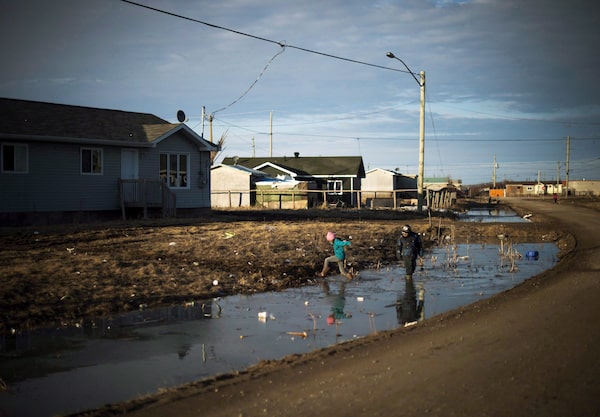
Indigenous children play in the northern Ontario First Nations reserve in Attawapiskat, Ont., in 2016. Proposed funding in the federal budget, which would begin this fiscal year, includes $2.4-billion over five years for First Nations housing on reserves.Nathan Denette/The Canadian Press
The federal government has earmarked more than $4-billion over seven years for spending on Indigenous housing, but the budget pledge falls far short of what advocacy organizations say is needed to reverse decades of neglect.
The proposed funding, which would begin this fiscal year, includes $2.4-billion over five years for First Nations housing on reserves, $565-million for self-governing First Nations and modern treaty holders, $845-million over seven years for housing in Inuit communities, and $190-million over seven years for Métis communities. Another $2-billion has been set aside to address the housing needs of First Nations children, part of continuing reforms to the government’s First Nations Child and Family Services program.
The budget also includes $300-million over five years, beginning in 2022-23, to launch an urban, rural and northern Indigenous housing strategy through the Canadian Mortgage and Housing Corp.
The minority Liberal government’s commitment to improve housing in Indigenous communities is part of a budget chapter titled, “Moving Forward on Reconciliation.” Finance Minister Chrystia Freeland said Thursday that reconciliation is the second-highest area of spending in the fiscal framework and called the $4-billion proposed for housing a “meaningful commitment.”
Federal budget earmarks $56-billion in new spending, higher taxes, but short on growth plans
Federal budget 2022 highlights: What you need to know about housing, defence and climate spending
Expectations were high heading into the budget among Indigenous groups who had urged the government to take immediate action to address a backlog in housing. Last month, Indigenous Services Minister Patty Hadju said in an interview that she had put forward an “ambitious” ask to Ms. Freeland on Indigenous housing, but she did not specify the dollar figure.
The issue was also referenced in the supply-and-confidence agreement between the federal NDP and the Liberal government. The deal between the two parties said there was a need to make a “significant additional investment in Indigenous housing in 2022.” In a news release, the New Democrats said Thursday that additional spending in areas such as Indigenous housing was due to its influence.
The Assembly of First Nations said Thursday it was pleased to see increased spending on housing and child and family services but noted $2.4-billion over five years for First Nations housing on reserves “falls well short” of the need identified by the organization. The Federation of Sovereign Indigenous Nations said the budget is a good start, but more housing investments are required.
Prior to the budget’s release, the AFN had called for $44-billion in federal funding to address current needs, saying the housing crisis has been created by decades of “federal neglect and underfunding.” The group said an additional $16-billion was required to accommodate population growth to 2040.
Inuit Tapiriit Kanatami, the national organization representing 65,000 Inuit in Canada, said the budget “ushers in a new era in housing investment for Inuit,” adding the planned funding is three times the $400-million allotted in the 2018 budget over 10 years. In its prebudget submission, the ITK had said $3-billion over the next decade is needed for housing units as well to maintain and repair existing stock.
The federal budget also includes $209.8-million over five years beginning this fiscal year for documenting, locating and memorializing of burial sites at former residential schools, as well as for a new building for the National Centre for Truth and Reconciliation (NCTR) and for the disclosure of documents.
Stephanie Scott, the executive director of the NCTR, said the budget “delivers sustainable funding” for the construction and operation of a new building to house the five million records, 7,000 survivor statements and other items gathered during the Truth and Reconciliation Commission (TRC).
The Native Women’s Association of Canada said it is pleased to see more money has been set aside for infrastructure on reserves and to help First Nations locate burial sites at former residential schools.
The budget also earmarks $10.4-million over two years, starting in 2022-23, to support the appointment of a special interlocutor to work with Indigenous peoples and make recommendations for changes to federal laws and practices to preserve unmarked burial sites.
The fiscal blueprint also includes $398-million over two years, beginning this fiscal year, for infrastructure on reserves and says at least $247-million will go toward water and wastewater infrastructure. There are 34 long-term drinking water advisories in effect in 29 First Nations communities, with some communities dealing with more than one advisory.
For subscribers: Get exclusive political news and analysis by signing up for the Politics Briefing.